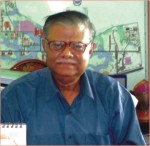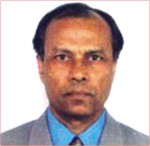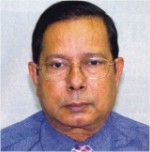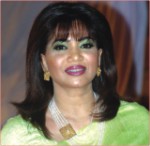Feature
'Ah! Those rainbow days we left behind……'
Alumni feelings on Dhaka University
Dr. Faheem Hasan Shahed and Feeda Hasan Shahed
Prologue
The University of Dhaka is not only a witness to history, but also the maker of history; to be precise, it is history by itself. These are the words of eminent educationist and author Prof. Husne Ara Shahed which she said in her edited book Srmitimoy Dhaka Bishshobidyalay (Unforgettable Dhaka University), published by the Dhaka University Alumni Association in 2006.
Admittedly, this university has produced people who, by virtue of their contributions, attained institution-hood and became part of history as well. This is probably the most unique role it has played so far in our society. The question is: how could it do so? And why cannot it do so now like before?
So, we went to some of the renowned alumni once again, and here are their verbal offerings for the nation. We believe, these are the utterances that can make readers rethink the issues and reactivate their minds.
Kazi Fazlur Rahman
 'My university is a living soul filled with self-power.' 'My university is a living soul filled with self-power.'
Kazi Fazlur Rahman is a man of versatile aptitude. Apart from being an outstanding student of Statistics, he served the media as an active journalist in his early life, served Dhaka University as a dynamic lecturer, served the government as a luminous civil servant, served our democracy as an Advisor of the First Interim Government (1990-91), and has been serving the literary world as a columnist and author till now.
'The greatest day of my university life was obviously the 21st February 1952. And what makes me elated is my involvement as an activist in the events whirling round that momentous day, starting from pamphlet-distribution, fund-collection to lathicharge-recipient of the police.' Kazi Fazlur Rahman went back to those days in profound satisfaction. 'That was a time when being a university student was a matter of great honor in the society. And because of this, even the Urdu-speaking people of Old Dhaka got furious at the news of police action against students.'
He narrated how narrowly he escaped imprisonment. 'On 24 February the police and the military surrounded our S. M. Hall and mercilessly arrested the students. A German professor of Mathematics sheltered me in his house that was adjacent to my hall, and thus I was saved.
My second life in Dhaka University started in mid-1954 when I joined my Statistics department as a lecturer. In 1955, I got appointment as an Assistant House Tutor of S. M. Hall with a comfortable small house on the hall premises. However, I had to go for higher studies in the UK at the end of that year leaving behind my favorite university. That was in fact the end of my association with Dhaka University. I returned home to join the Civil Service of Pakistan. However, I will forever cherish my tenure as a teacher where I came across numerous students who later on became my colleagues in the civil service.'
In the passage of time, Dhaka University has lost much of its glory for many reasons. Mr. Rahman still has hopes. 'A university is not merely a combination of buildings, chairs, tables, files. It is a sanctimonious identity, a living soul filled with self-power. My university has the capability to resurrect. Brighter days in future will overshadow these gloomy days for sure.'
Dr. Khandaker Mustahidur Rahman
 'Our teachers opened a wide window in front of our eyes.' 'Our teachers opened a wide window in front of our eyes.'
A renowned economist, Prof. Khandaker Mustahidur Rahman is the Vice Chancellor of Jahangirnagar University. Besides being the Syndicate and Senate member of that university, Prof. Rahman has served the academic world as a cerebral researcher and author. He has also been associated with several national and international scholastic communities.
'I had the fortune to be a student under renowned teachers like Prof. Abu Nasr Mahmud, Prof. Rehman Sobhan, Prof. K. T. Hossain et al who used to give a broader overview of the subject matter.
Then there were many young teachers who were very good at making us understand the topics. Most of my classmates were place-holders in their Intermediate exams under different boards. So the competition inside the class was understandable.' Prof. Rahman recalled his campus days.
He mentioned that there was no spoon-feeding concept like that of today. Teachers came and lectured, and the rest was up to the students to rush to the library, find the reference books and get updated. 'Our teachers induced us to learn,' he said.
However, Dhaka University was going through turmoil at that time and agitation against NSF reached its peak in 1967-68 when the university was declared close sine die. 'This sine die, in fact, invited the 1969 mass movement against Ayub Khan,' he mentioned.
We came to know from him how students and especially student leaders enjoyed the respect they got everywhere. 'So much so that student leaders quite often didn't have to pay fares in buses or trains,' he said.
Unlike today, the educational standard of Dhaka University was comparable to that of foreign universities, he maintained. 'The way my teachers made us view the greater world beyond the classrooms is matchless. After each of their lectures, new horizons, new windows of creativity used to open in front of our eyes all the time; and we used to derive blissful pleasures out of that. Studying was like an adventure to us.'
What did Dhaka University teach that other places did not teach? 'Simple. We learned to think big and feel big. In our time, Dhaka University had no place for anti-progressive forces. We were really lucky to have grown up amid a liberal, profound campus environment that eventually shaped our inner worlds.'
Dr. A. F. Imam Ali
 'I was part of the most significant tenure in my university.' 'I was part of the most significant tenure in my university.'
Professor and Ex-Chair of the Department of Sociology at Chittagong University, Dr. A.F. Imam Ali has been country's one of the prominent sociologists. He has conducted many fundamentally important research works and has held several prestigious academic and administrative positionsthat includes his membership of the Senate, University of Dhaka. He was the Secretary General of Bangladesh University Teachers' Association Federation in 1988.
Reminiscing his university life, he mentioned how he was fortunate to have spent probably the most significant tenure in the life of Dhaka University, i.e. 1968 to1972. 'In fact, I got admitted in such a time when the 6-point movement had just concluded, but the impact was still very much there. Then almost immediately after I started my classes, the anti-Ayub movement reached its peak in 1969. Then came the student agitation in 1970, followed by our glorious liberation war in 1971. And finally arrived our much-desired independence at the end of my student career. Therefore, my time was remarkable,' said Dr. Ali, 'and I take great pride in it.'
Dr. Ali added, 'What particularly makes me feel honored till today is the fact that during those fiery days of my career, I took part in all kinds of activities as a Bangladesh Students Union (Motia Chowdhury group) activist. I never thought for myself at that time; what occupied my mind was the thought for my nation. I learned at that time how we as citizens were destined to rebuild our national identity, free from the evil of colonizers. That powerful nationalistic sense eventually shaped my future life.'
He is saddened by the gradual downgrading of his alma mater. 'See, depreciation at every level of our national life has affected Dhaka University. Students and teachers have systematically learned to use each other to fulfill narrow personal gains. Student bodies kept on acting as hyper-loyal copycats of different political parties. Many teachers aren't dedicated toward their work like before.'
Prof. Ali further maintained that all corrupt university personnel regardless of VCs, Pro-VCs, Deans, administrators must be brought under proper justice if found corrupt. He finally made a personal point by saying that if teachers follow most of the issues of the 1973 Ordinance, there is every chance that things would improve. Some issues may be rectified or modified, but that should be done through adequate discussion among the teachers, though mutual concurrence among them.
Dr. Anwar Hossain
 'IBA has been Dhaka University's gift to the nation…' 'IBA has been Dhaka University's gift to the nation…'
Professor Anwar Hossain was originally a student of Sociology who later shifted to Business education. During his Doctoral research in Indiana University, USA, he founded the Bangladesh Student Association to mobilize American support and collect aid for our Liberation War. Former Director of IBA and now the Dean of Faculty of Business at AIUB, Prof. Hossain has been a pioneering personality in his pursuit to foster quality business education.
'As an identity of Dhaka University, IBA's role to promote a much-neglected sector in our education, i.e. the business education, has been matchless,' said Prof. Anwar Hossain.
How? He continued, 'When IBA was established in 1966, the concept of modern business education was absent here. The traditional commerce education was completely based on the British system with old-fashioned curricula and teaching-learning styles. In such a context, the Indiana University of USA extended its technical support while Ford Foundation provided the financial aid to establish this institute. The prime objective of this institute was to create well-educated, efficient executives for the corporate world in the then East Pakistan.
'The feedback was very positive. MBA, being a new type of degree in the East Pakistani context, helped the limited number of IBA graduates to secure good positions in the corporate sectors. Today if we look at our corporate world, we would see that most of the large industrial houses, multinational companies, leading corporations, banks etc are being managed by the IBA alumni who passed out during those initial years.'
IBA initiated its BBA program in 1992 to attract the brighter undergraduate student segment that went to medical, engineering and other disciplines. 'This BBA program eventually became one of the most popular programs in our higher education arena, 'Prof. Hossain said, 'and you can see how not only the public universities, but also the private universities are successfully running this. All these BBA graduates have been contributing to our economic and industrial developments. I'm happy to say that IBA has led the way.'
He further narrated a significant point by saying that in most of our private universities, the Business schools are of the largest sizes, which are run by either teachers or alumni of IBA. That means IBA has prominently created the required leadership in both the business administration and business education fields. 'Isn't it a great gift of Dhaka University toward the nation?' he asked.
Mofazzal Karim
 'That slap, and my dramatic life…' 'That slap, and my dramatic life…'
Mofazzal Karim has been familiar more as a poet and writer than as an ex-bureaucrat. His poems display both lyrical mood of romance and subtle articulation of satire that is mesmerizing. Even in his professional career, he maintained his not-that-typical-bureaucrat stature with his easy-going personality and ready sense of wit. At present, he is engaged in politics and column-writing.
He still remembers his bizarre hall life. 'I was a resident of Shahidullah Hall (then Dhaka Hall) for two years, became the most prominent student with all sorts of co-curricular activities ranging from football-volleyball-cricket to literary competitions, became the all-university Literary Champion in 1961, and yet got expelled in my third year.' Mofazzal Karim said.
Why was that! 'We got single-seated rooms when we entered our third year. But I was shocked to see how an awful room was allocated to me despite having the best academic background. My only crime was being a Bangladesh Student Union activist. I argued arrogantly with the provost due to which he had to give me a good room that he initially had given to a NSF-boy. But since then, I got into the bad-book of the provost and house tutor who were both pro-NSF, and they started looking for the right opportunity to get rid of me.
'Then one evening, that NSF-boy whose room was given to me met me on the stairs. He started shouting at me for no reason, and at last losing my temper, I deposited a slap on his face. People who heard that sound later said, they thought a rickshaw tire had burst, ha ha ha. Anyway, that was it. Without given any chance of self-defense, I was expelled in a moment's notice. And since then started my traumatic vagabond life for the last two years spending nights in different halls.'
He finally narrated an interesting story about the Madhu's Canteen. Madu-da, owner of this famous canteen, used to maintain a khata where the names of students were written along with the date-time of the items they had eaten and most importantly, the dues that they owed to him! Of course, these dues were left unpaid. A legend went like this, if you have baaki (unpaid dues) in Madhu's khata, you'll get good jobs after graduation. Therefore, never fully pay your dues in Madhu's Canteen if you aspire to shine in life!
'But remember, that was a legend of OUR times. Don't you dare follow that now,' warned a jovial Mofazzal Karim.
Shakila Jaffar
 'I'll never forget the divine life my university awarded me!' 'I'll never forget the divine life my university awarded me!'
Since early eighties, Shakila Jaffar has enthralled the audience home and abroad with her classically enriched melodious voice and her inimitable style of on-stage presentation. Besides, she has won several prestigious awards for her contribution to music.
A versatile artist who can also sing in many different languages, Shakila is one of the rarest musical personalities in our country who never compromises with melody.
Talking about her life in Dhaka University, Shakila Jaffar recalled the unconditional affection from her teachers and the supportive love from her friends. 'By God's mercy, I passed a heavenly life. Apart from being the DUCSU champion in music, I have been lucky to earn the admiration of each and every individual in my campus throughout my entire tenure from 1978 to 1984. Late Zaman sir, TSC's Director, loved me like his own daughter. And do you know how divinely I enjoyed all the singing and chatting in the corridors, fields, tree-shades, Madhu's Canteen along with my friends. Teachers from other departments would call me to their offices to sing.' She then highlighted a very crucial point. 'In my time, the university environment was full of dignity, purity and divinity. The value system was high. Boys and girls behaved decently among them.'
She wittily mentioned how Dhaka University gifted her two biye-s at the same time; one biye was her 'BA (Honors)' in Philosophy, and the other biye was her 'marriage' with Mr. Jaffar. 'A boy used to follow me gently during my Honors final exam period and politely asked me later how good my exam had been. I used to get perplexed but still answered positively. When my exam finally finished, there was this marriage proposal from his house, and I came to know he was the brother-in-law of Dr. Enamul Haque, eminent playwright and actor.'
Shakila lamented, 'I'm shocked to see how good things are turning upside down now. Today's kids are learning computer and developing electronic sense but at the cost of their “acoustic” sense! By this, I mean a wide range of things like ethics, modesty, knowledge, kindness etc. Also, young people's God-fearing attitude is perishing.' In such circumstances, she draws her strength from her inner mind. 'Whenever I feel gloomy, I remember firstly God; then I recall my parents-teachers-friends, and my university life. They are the pillars that I've built inside me, and I know, they are always by my side to help me out of adversities.'
Shenin Ziauddin
 'We use to read for knowledge and wisdom, not just for marks...' 'We use to read for knowledge and wisdom, not just for marks...'
Since long, Shenin Ziauddin has been popular not only for her graceful, glamorous look as BTV's English newscaster, but also for her relaxing, effortless style of news presentation. Besides, she is a faculty member of English Literature at the BRAC University, an equally admirable personality among the academic circle.
She nostalgically recalled her university days in the English Department to tell how they had influenced her in building her profession both as news presenter and a teacher. 'I learned a lot from my teachers, from their mannerism, knowledge, and personality. I always wanted to become a teacher and that dream got matured due to them,' said Shenin Ziauddin. 'What I now feel is, the whole department had an overwhelming cultural dominance on my mentality at that tender graduation days, and that dominance systematically fashioned the foundation behind both my professions.
However, things have degraded in the passage of time, she feels strongly, and the blame should go mostly to the overall downfall in societal attitudes. 'We had better atmosphere, better outlook, better dedication level from all and that is missing now. We had more respect for our teachers. Inside our classrooms, we tried to grasp the essence of the subject itself, we went deep into the characters of the novels, into the matters of the essays, into the romance of the poems. We knew, the real pleasure was lying beyond the lines written on the books, the words uttered by our teachers, and we gave our efforts for deriving that pleasure.' Shenin further said, 'Of course, students should study for good results, but that doesn't mean studying something without wisdom and running after grades! I am happy to say that we used to run after knowledge and wisdom. And that paid us back.'
Shenin also narrated how the quality of education in Dhaka University has lost its true color. 'In the recent years, even my department has failed to produce the desired number of quality graduates like the yesteryears. I found many English graduates whose understanding of the subject is very poor. Also they can't talk or write in English at all. In our times, students' fluency in speaking was tremendous; in fact, it was a taken for granted thing.'
Remedy? 'May be waiting for the overall situation to improve,' she said, 'hopefully it will.'
Epilogue
Rabindranth Tagore in his 'Creative Unity' remarked, 'Through them [universities] the people should offer their intellectual hospitality, the wealth of minds to others, and earn their proud right in return to receive free gifts from the rest of the world.' This is what Dhaka University once used to do, and that's why it was the Oxford of the East.
From the views of some alumni, that in fact echo the sentiments of the lots of people, we have seen some glimpses of their glorious lives in the campus. At the same time, we notice their concern regarding their alma mater. Accepting the fact that twists and turns are inextricable parts of a living character, and Dhaka University is DEFINITELY a living character, one hopes that it is for the sake of our national survival that the lost 'Oxfordian glory' will bounce back with the same old brilliance, dignity and pride.
Is it such an impossible dream on your 86th birth year, Dhaka University?
| 